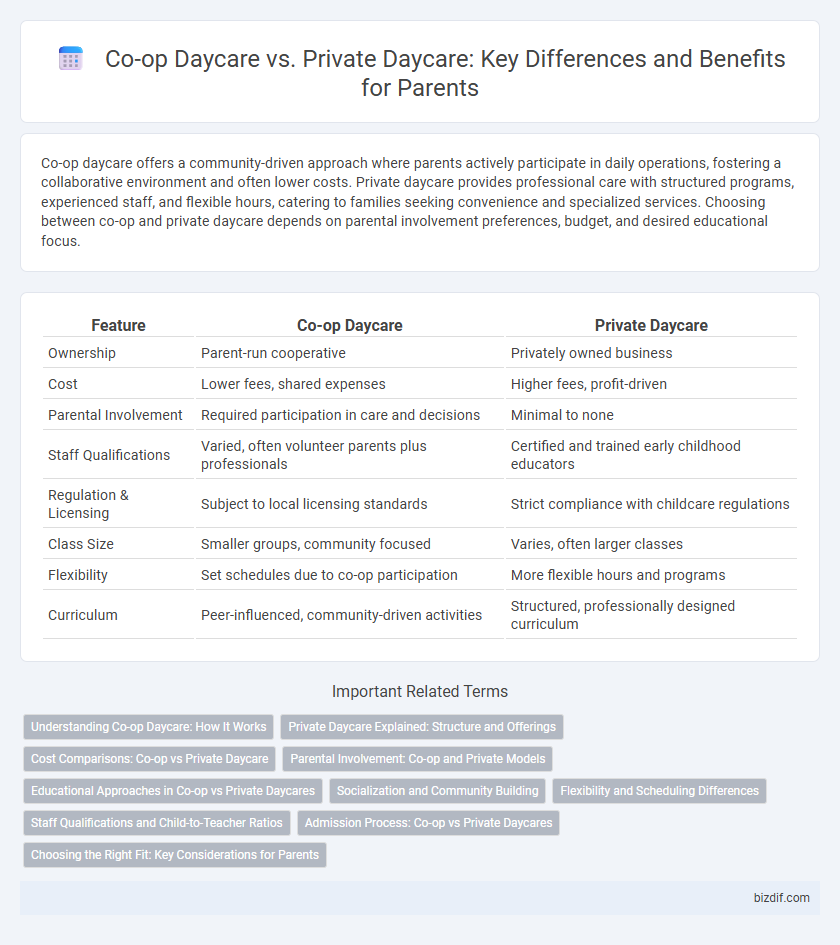Co-op daycare offers a community-driven approach where parents actively participate in daily operations, fostering a collaborative environment and often lower costs. Private daycare provides professional care with structured programs, experienced staff, and flexible hours, catering to families seeking convenience and specialized services. Choosing between co-op and private daycare depends on parental involvement preferences, budget, and desired educational focus.
Table of Comparison
| Feature | Co-op Daycare | Private Daycare |
|---|---|---|
| Ownership | Parent-run cooperative | Privately owned business |
| Cost | Lower fees, shared expenses | Higher fees, profit-driven |
| Parental Involvement | Required participation in care and decisions | Minimal to none |
| Staff Qualifications | Varied, often volunteer parents plus professionals | Certified and trained early childhood educators |
| Regulation & Licensing | Subject to local licensing standards | Strict compliance with childcare regulations |
| Class Size | Smaller groups, community focused | Varies, often larger classes |
| Flexibility | Set schedules due to co-op participation | More flexible hours and programs |
| Curriculum | Peer-influenced, community-driven activities | Structured, professionally designed curriculum |
Understanding Co-op Daycare: How It Works
Co-op daycare operates on a community-driven model where parents actively participate in daily childcare responsibilities, fostering a collaborative environment that often reduces costs compared to private daycare centers. Parents typically contribute time by volunteering in the classroom, assisting with administrative tasks, and participating in decision-making processes, which strengthens trust and communication between families and caregivers. This shared involvement not only builds a supportive network but also enhances the overall quality of care through collective efforts and personalized attention to children's needs.
Private Daycare Explained: Structure and Offerings
Private daycare centers operate independently, often owned by individuals or organizations, offering flexible, tailored childcare services catering to varied family needs. These centers prioritize personalized curricula, smaller group sizes, and enhanced facilities, promoting individualized attention and development. Services typically include extended hours, specialized programs, and enriched learning environments focused on early childhood education and socialization.
Cost Comparisons: Co-op vs Private Daycare
Co-op daycare typically offers lower fees compared to private daycare due to shared responsibilities among parents, reducing operational costs. Private daycare centers incur higher expenses for staff salaries, facilities, and administration, which reflects in their higher tuition rates. Families seeking affordable childcare often prefer co-op options, while private daycare provides more structured programs and amenities at a premium price.
Parental Involvement: Co-op and Private Models
Co-op daycare models emphasize high parental involvement, requiring parents to actively participate in daily operations and decision-making, fostering a strong community bond and increased engagement in their child's development. Private daycare centers typically offer professional staff-led programs with limited parental involvement, focusing on convenience and structured care without the necessity for parents to contribute time or resources. This fundamental difference impacts the overall experience, with co-ops promoting collaborative parenting and private daycares providing more independent, service-oriented care.
Educational Approaches in Co-op vs Private Daycares
Co-op daycares emphasize collaborative, community-driven educational approaches that foster parental involvement and tailored learning experiences, often integrating play-based and emergent curricula. Private daycares typically offer structured, curriculum-based programs designed by professional educators, focusing on early childhood development milestones with specialized resources and trained staff. Both settings aim to promote cognitive, social, and emotional growth, but co-op daycares prioritize shared responsibility and peer learning while private daycares emphasize expert-guided instruction.
Socialization and Community Building
Co-op daycare centers promote socialization by encouraging active parent involvement and fostering strong community bonds among families, creating a supportive environment for children. Private daycares often provide structured social settings guided by professionals but may lack the same depth of community engagement found in co-op models. The collaborative nature of co-op daycares enhances children's social development through shared responsibilities and meaningful connections.
Flexibility and Scheduling Differences
Co-op daycares often provide greater flexibility and customizable scheduling options since parents actively participate in managing daily operations, allowing for more adaptable drop-off and pick-up times tailored to families' needs. Private daycares typically offer fixed schedules with less room for alterations, adhering to structured hours and standardized programs designed for efficiency and consistency. Families seeking flexible childcare solutions tend to prefer co-op arrangements, while those prioritizing convenience and professional management often opt for private daycare centers.
Staff Qualifications and Child-to-Teacher Ratios
Co-op daycare centers often rely on parent volunteers, which can result in varied staff qualifications compared to private daycares that typically employ certified early childhood educators. Private daycares usually have lower child-to-teacher ratios, ensuring more individualized attention and tailored learning experiences. Research shows that qualified staff and smaller ratios contribute significantly to improved developmental outcomes in young children.
Admission Process: Co-op vs Private Daycares
Co-op daycare admission processes often require parent involvement, including participation in meetings and volunteer hours, reflecting a community-driven model. Private daycare enrollment typically involves a straightforward application and fee-based system, prioritizing convenience and flexibility for families. Understanding these distinctions helps parents choose the best fit for their childcare needs and scheduling preferences.
Choosing the Right Fit: Key Considerations for Parents
Evaluating co-op daycare versus private daycare involves assessing factors such as cost, caregiver experience, and community involvement to determine the best environment for a child's growth. Co-op daycares often offer lower fees and increased parental participation, fostering a strong sense of community, while private daycares provide professional staff and structured programs with flexible hours. Parents should prioritize criteria like teacher-to-child ratio, facility quality, and philosophy alignment to ensure the chosen daycare meets developmental and safety needs.
Co-op Daycare vs Private Daycare Infographic

 bizdif.com
bizdif.com